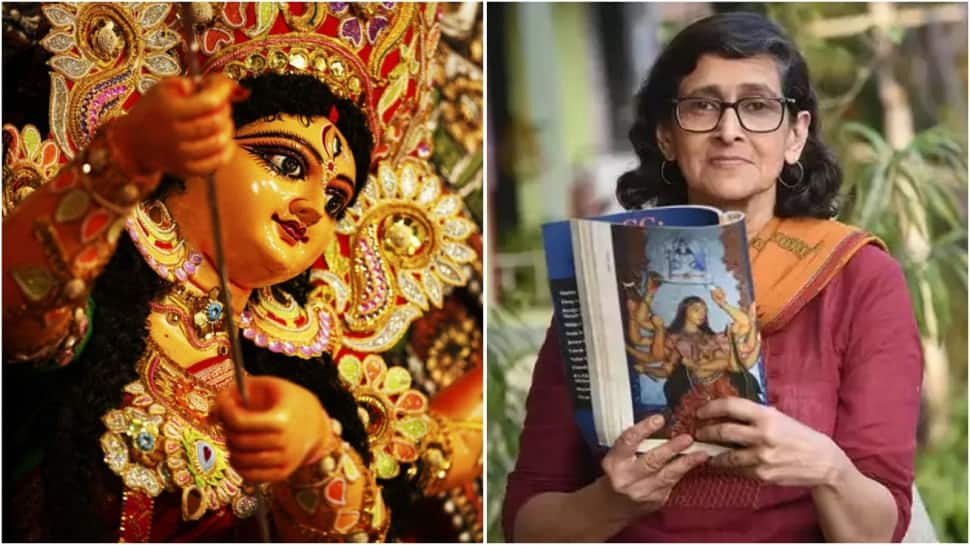'In the Name of the Goddess: The Durga Pujas of Contemporary Kolkata', written by historian Tapati Guha Thakurta in 2015, traces the development of traditional pujo to its contemporary manifestations. She intended to draw attention to the major festival's artistic, cultural, and social, economic aspects, in addition to its religious features. In December 2021, UNESCO included the Durga Puja on its list of 'Intangible Cultural Heritage' in recognition of this. The historian behind this prized designation was Guha-Thakurta, who was picked by the Ministry of Culture to highlight how important a role the 10-day festival plays in Kolkata's socio-cultural and political scene.
Tapati Guha Thakurta: Background
She studied history at Presidency College in Calcutta and Calcutta University before earning her D.Phil. from the University of Oxford's History Faculty. Her work falls within the categories of cultural history, art history, and visual studies. Her research interests include art, nationalism, and modernity, institutional practices and political contexts of art history and archaeology; the lives of monuments and museum items; and popular urban visual culture in modern and contemporary India. Her three main publications are The Making of a New 'Indian' Art: Artists, Aesthetics and Nationalism in Bengal (1992), Monuments, Objects, Histories: Institutions of Art in Colonial and Postcolonial India (2004), and In the Name of the Goddess: The Durga Pujas of Contemporary Kolkata (2015).
Early Research Days
How can Durga Puja change our concept of who an artist is and what defines art? This was the issue Guha-Thakurta set out to address when she started her research in 2002–2003. Guha-Thakurta started looking into the characteristics of the modern festival with coworker Anjun Ghosh and a group from the Centre for Studies and Social Sciences, Kolkata, where she has served as a professor and director of history. She claims that the pair had a committed team of researchers and that their work was seasonal, usually starting a few months before each year's celebrations. Unfortunately, Anjun passed away unexpectedly from cancer in 2015.
Durga Puja: A Festival Beyond Simple Worship
Guha Thakurata claims that going around the city and observing how the pandals and artistic displays take you through many eras of time as well as different geographic locations is an essential component of pujo. She also discussed how street-level productions blend with the Bonedi Barir Pujo, the festival's most traditional celebration that primarily takes place within homes. Guha-Thakurta highlights that her work was a study of Durga Puja's novelty—the sponsorship, awards, marketing, and commercialization that have inextricably linked the phenomenon—rather than a history of the festival. She refers to it as a present history. Durga is always welcomed with open arms at home, and everyone's participation in the festivities goes beyond simple worship. Through advertisements and images, she contributes to the commercialization as well.
The Big Challenge
The Ministry of Culture encouraged Guha-Thakurta to compile a thorough dossier to send to UNESCO based on her decades-long research. Previous attempts by the government to achieve this recognition had not taken the necessary form. She claimed it was difficult to convey the depth and breadth of the significance of Durga Puja. Each question was brief, and replies could only be between 150 and 300 words. According to her, she succeeded to some extent by taking a close look at the Durga Puja laws that deal with issues like tree damage, water and sound pollution, road safety, electricity theft, and other issues. She claims that the police and municipal authorities have been collaborating for many years to moderately control the celebrations. She claims that the government has also attempted to control immersion by building distinct immersion waterbodies called devi ghats so that the Hooghly River won't take the brunt of it all.
Guha Thakurta claimed that the importance of Durga Puja in the city of Kolkata was less important to the government of India than its inclusion as a national phenomenon. She points out that UNESCO showed interest in the festival's gendered aspect as well. After some questions were answered regarding the final dossier, which was presented in March 2019, the candidature for the UNESCO Lists of Intangible Cultural Heritage came in 2021. However, Guha Thakurta further points out that the UNESCO designation is reviewed every five years.
















